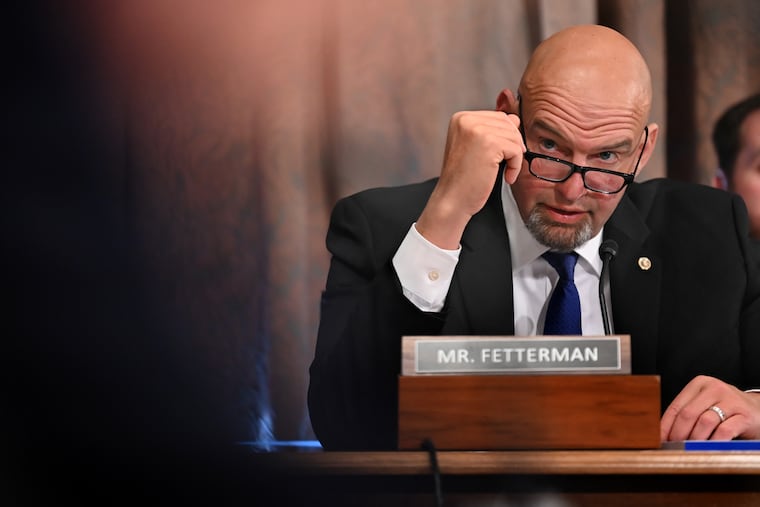Why Fetterman voted no on the debt ceiling bill. He was one of just four Democrats to oppose it.
The Pa. senator said his vote came down to new work requirements on older Americans receiving food aid.

Pennsylvania’s two Democratic senators split their support for a debt ceiling and budget cuts package, which passed the Senate late Thursday. The bill now goes to President Joe Biden, who is expected to sign it, ending a months-long congressional slog to avoid national default with days to spare.
Sen. Bob Casey voted for the bill to suspend the debt ceiling, which passed 63-36. Freshman Sen. John Fetterman joined four fellow Democrats and Sen. Bernie Sanders (I., Vt.) in opposing the bill.
The compromise package negotiated between Biden and House Speaker Kevin McCarthy left both Democrats and Republicans displeased on certain points but able to move on from a volatile issue that risked upending the U.S. and global economy until 2025 after the next presidential election.
Fetterman said his vote came down to new work requirements on older Americans receiving food aid, a part of the bill added to sweeten the deal for Republicans pushing for more government spending cuts. Currently, the law requires most able-bodied adults between the ages of 18 and 49 without dependents to work or attend training programs in order to receive assistance. The bill phases in a higher work age cutoff of 54.
Fetterman said he feared, as McCarthy has signaled, a GOP win on the issue could lead to a push for more work requirements down the road.
“I did not agree to these SNAP restrictions, and I won’t give Republicans an opening to try and take food from more food insecure Americans in Farm Bill negotiations later this year,” Fetterman said in a statement after the vote.
Fetterman chairs the nutrition subcommittee on agriculture and is working on the forthcoming Farm Bill.
He campaigned on being Democrats’ 51st vote and said if passage had depended on him, he would have supported the bill.
“As I communicated to leadership and the White House, I would have voted to avoid default if it would have made the difference,” Fetterman said. “All in all, this was a tough vote and an ugly situation manufactured by extortionists. While we avoided a catastrophe this time around, we should never put the country in this situation again.”
Fetterman also urged Biden to try to invoke the 14th Amendment to override the debt ceiling in future debt crises.
Fetterman returned to office in April after a three-month absence during which he was treated for severe depression. He’s spoken candidly about his mental health struggles and transition back to work. In his first week back, he chaired a subcommittee hearing on agriculture food and nutrition, where he indicated his opposition to any cuts to food assistance.
“SNAP is one of the most effective programs to fight poverty and hunger,” Fetterman said at that hearing. “We need to come together and stop playing political games with Americans’ access to food.”
Democrats Edward Markey (Mass.), Jeff Merkley (Ore.) and Elizabeth Warren (Mass.) were the other three Democrats who voted against the bill. Thirty-one Republicans voted against it.
Overall, the 99-page bill restricts spending for the next two years, suspends the debt ceiling into January 2025, and changes some policies, including the new work requirements and green-lighting an Appalachian natural gas line that many Democrats oppose.
It bolsters funds for defense and veterans, cuts back new money for Internal Revenue Service agents and rejects Biden’s call to roll back Trump-era tax breaks on corporations and the wealthy to help cover the nation’s deficits. It imposes automatic 1% cuts if Congress fails to approve its annual spending bills.
While the bill phases in work requirements for adults ages 50 to 54, Democrats successfully argued to exempt vulnerable recipients like veterans and people who are homeless — on the whole expandingfood stamp rolls. The result is an estimated increase in spending of $2.1 billion, according to the Congressional Budget Office.
As part of the compromise with Democrats, the provision is slated to expire five years later. At that time, the maximum age for the work requirements would drop back down to 49.
The bill passed in the House earlier on Thursday, with the majority of the Pennsylvania delegation backing it. One Democrat, Rep. Summer Lee, and one Republican, Rep. Scott Perry, voted no on the bill.
The Associated Press contributed to this article.